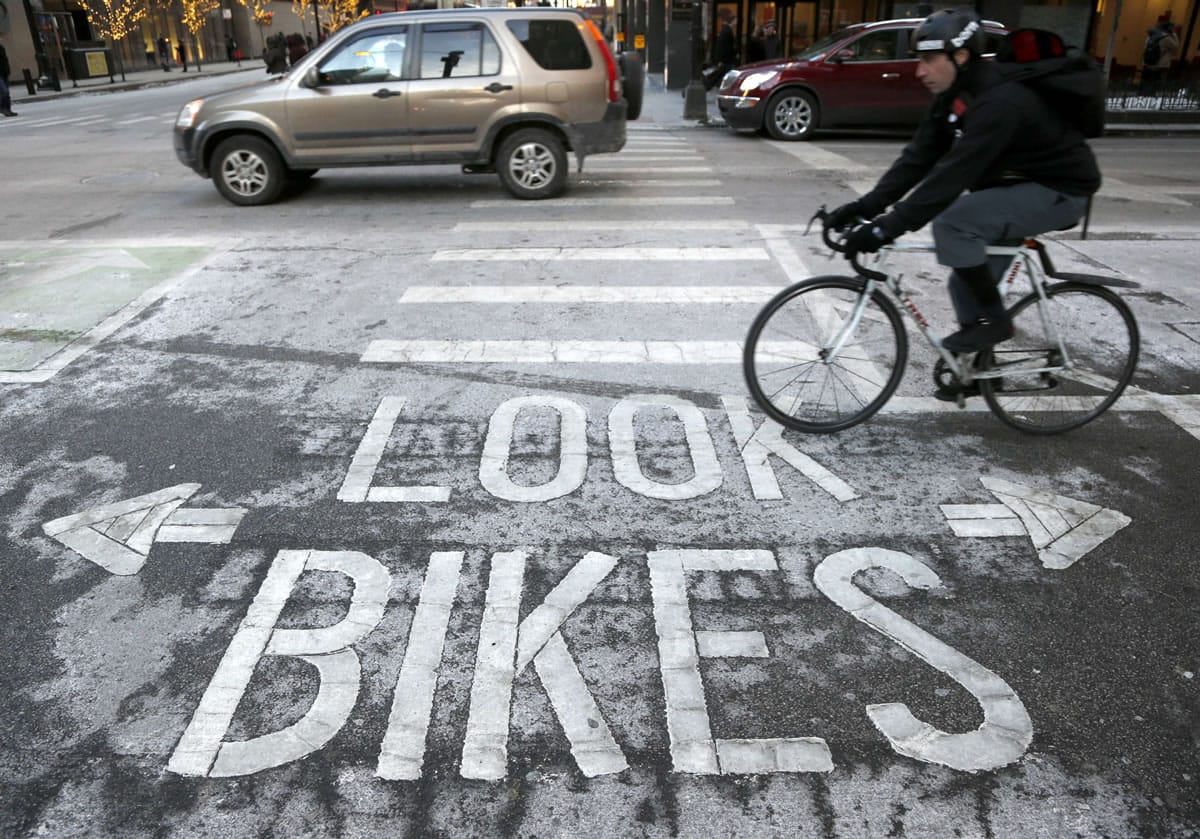CHICAGO — Early blasts of snow, ice and below-zero temperatures haven’t stopped a surprising number of Chicago cyclists from spinning through the slush this winter, thanks in part to a city so serious about accommodating them that it deploys mini-snow plows to clear bike lanes.
The snow-clearing operation is just the latest attention city leaders have lavished on cycling, from a growing web of bike lanes to the nation’s second largest shared network of grab-and-go bicycles stationed all over town. But it also spotlights questions that have been raised here, a city wrestling with deep financial problems, and across the country.
Who is paying for all this bicycle upkeep? And shouldn’t bicyclists be kicking in themselves?
A city councilwoman’s recent proposal to institute a $25 annual cycling tax set off a lively debate that eventually sputtered out after the city responded with a collective “Say what?” A number of gruff voices spoke in favor, feeding off motorists’ antagonism toward what they deride as stop sign-running freeloaders. Bike-friendly bloggers retorted that maybe pedestrians ought to be charged a shoe tax to use the sidewalks.
“There’d be special bike cops pulling people over? Or cameras? What do you do (to enforce this)?” asked Mike Salvatore, owner of Heritage Bicycles, a new Chicago hangout that neatly blends a lively cafe with a custom bike-building workshop in a 19th-century building.
Chicago is by no means the only place across the U.S. tempted to see bicyclists as a possible new source of revenue, only to run into questions of fairness and enforceability. That is testing the vision of city leaders who are transforming urban expanses with bike lanes and other amenities in a quest for relevance, vitality and livability — with never enough funds.
Two or three states consider legislation each year for some type of cycling registration and tax — complete with decals or mini-license plates, National Conference of State Legislatures policy specialist Douglas Shinkle said. This year, it was Georgia, Oregon, Washington and Vermont. The Oregon legislation, which failed, would even have applied to children.
“I really think that legislators are just trying to be as creative as possible and as open to any sort of possibilities to fill in any funding gaps. Everything is on the table,” he said.
This is nothing new
It’s not a new idea. The Netherlands, where a cycling lifestyle has long been the norm, had bike taxes from 1924 to 1941, when the Nazis did away with it in a gesture meant to win over the Dutch.
Hawaii has had a statewide bike registration law for decades, as has the normally tax-hating city of Colorado Springs, Colo., though in both cases, they are one-time fees and all proceeds go toward bicycle infrastructure.
In the case of Colorado Springs, the proposal came from the cycling community itself. The $4 tax on the purchase of new bikes has been in place since 1988, and no one seems to mind. It only raises up to $150,000 a year, but it’s useful as a local match for federal grants. And it gives cycling advocates leverage when pushing for bike projects. For one thing, it has revealed that 25,000 bikes are sold each year, a big number in a city of 430,000.
“The idea was to legitimize bicycles,” explained Al Brody, a cycling enthusiast and retired Air Force officer who once coaxed a city councilwoman on a trek up Pikes Peak to lobby for opening up the mountain roadway to bicyclists. “It’s in your face: We’re paying taxes, this is how many bikes we’re selling.”
Irritation in Portland
Portland is handing over entire traffic lanes to cyclists downtown, irritating some businesses.
Robert Huckaby, who owns a moving company, tried but couldn’t raise $1 million to get a measure on Oregon’s statewide ballot requiring a bicycle registration fee and licensing.
He acted after the city permanently closed a road that was a main entrance for his business because cyclists blowing a stop sign were getting hit by vehicles making turns.
“The unfortunate part is that we want to be known as the bike-friendly city of the United States, but no one’s listening to John Public,” Huckaby said. “They’re just listening to basically the city of Portland and the bicyclists.”



